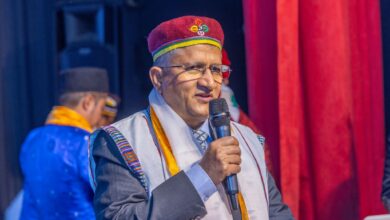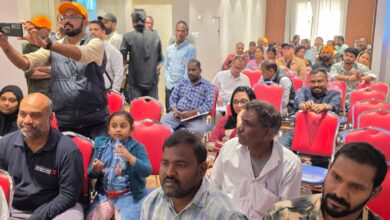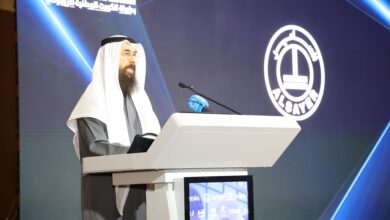Egyptian embassy, Wajha Center collab spotlights Sharif Rashad’s “Ode to the Hippopotamus”
A seminar was held under the patronage of His Excellency Osama Shaltout, Ambassador of the Arab Republic of Egypt to Kuwait, in cooperation with Wajha Cultural Center, to discuss Sharif Rashad's poetry collection "Ode to the Hippopotamus".

• Dr. Salem Khadada described Sharif Rashad as possessing a distinctive poetic voice who excelled in using textual thresholds, especially in the title of the collection “Ode to the Hippopotamus”, which was the title of the text in the collection and the first text in it.
• Dr. Mustafa Attia Jumaa noted that the poet did not resort to traditional methods and well-trodden poetic visions, but rather he inclined to new experiences based on the poetic simplicity of things or the school of things in creativity.
Under the patronage of His Excellency Osama Shaltout, Ambassador of the Arab Republic of Egypt to Kuwait, and in cooperation with Wajha Cultural Center, a seminar was held to discuss the poetry collection “Ode to the Hippopotamus” by the poet Sharif Rashad.
The seminar was attended by Dr. Salem Khadada and Dr. Mustafa Attia Jumaa, who discussed the poet’s unique poetic experience and his ability to present new visions and perspectives through his poetry.
Dr. Ibrahim Salam, the general coordinator of the seminar, thanked Wajha Cultural Center for its cooperation and hosting the cultural evening. He stated that this is the third cooperation between the embassy and the center, expressing his hope for the continuation of cooperation in the future. He also praised Sharif Rashad’s poetry collection.
Mariam Al-Muharib, founder and director of Wajha Cultural Center, expressed her appreciation for the joint cooperation between the center and the Egyptian embassy and praised the role of Egyptian creators in the cultural fields of art and literature.
Sharif Rashad’s unique poetic voice
Dr. Salem Khadada spoke about his happiness to be at Wajha Cultural Center in cooperation with the Egyptian embassy.He highlighted the distinctive poetic voice of Sharif Rashad.
Dr. Khadada pointed out that Rashad excelled in using textual thresholds, especially in the title of the collection “Ode to the Hippopotamus”, which was the title of a text in the collection and the first text in it. The poet also excelled in choosing the weights of the poems, which all came in one weight.
Rashad’s break from tradition
Dr. Mustafa Attia Jumaa explained in his speech that when we contemplate the poet Sharif Rashad’s collection “Ode to the Hippopotamus”, we find a unique poetic experience.
Jumaa noted that Rashad did not resort to traditional methods and well-trodden poetic visions. Instead, he presented new experiences based on the poetic simplicity of things or the school of things in creativity. This school seeks to express the existing things and non-human creatures in a human way, speaking on their behalf.
Examples of Rashad’s work
Jumaa provided examples of Rashad’s work that exemplify this approach. The text “Diary of a Garbage Can” showed us the world through this box and the end of the text through the victory for a homeless child who searched in the depths of the box for food to eat.
The poem “Modern Laughter” is a collection of funny jokes full of bitterness and celebrates the marginalized.
Sharif Rashad speaks on his collection
The poet Sharif Rashad thanked His Excellency the Ambassador of the Arab Republic of Egypt to Kuwait, Osama Shaltout, and Wajha Cultural Center.
Rashad said that this collection is his fourth and represents a human experience where he sought to present a new vision for the world and the things around us. He also aimed to reshape the modern Arabic poem through language, metaphor,and even reliance on heritage.
The collection, he concluded, is a new step preceded by steps that paved the way for it and will be followed, God willing, by other steps that confirm it.
The seminar was a successful platform for cultural exchange and appreciation of contemporary Arabic poetry. It highlighted the innovative voice of Sharif Rashad and the vibrant literary scene in the Arab world.












